
|
![]()
Greatest Films of the 1930s
1930 | 1931 | 1932 | 1933 | 1934 | 1935 | 1936 | 1937 | 1938 | 1939
Title Screen Film Genre(s), Title, Year, (Country), Length, Director, Description 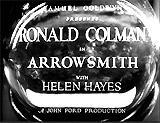

Arrowsmith (1931), 108 minutes, D: John Ford
Director John Ford's drama was an intelligent and faithful film adaptation of Sinclair Lewis's 1925 novel. In the plot, small-town, idealistic, young, and dedicated research doctor, Dr. Martin Arrowsmith (Ronald Colman) tried to remain true to his medical ethics - to help humankind rather than quickly acquire personal wealth. He left his practice to conduct research to help stop bubonic plague in the West Indies with a new serum. He suffered personal tribulations when his pure wife Leora (Helen Hayes) died. Tempted by commercial interests and quick, big money offers, he nearly strayed from his calling, but remained true to his idealism, although tempted by a vampish rich girl's love, Joyce Lanyon (Myrna Loy).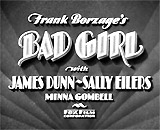

Bad Girl (1931), 90 minutes, D: Frank Borzage
Borzage's last film for Fox Studios was based on Viña Delmar's eponymous, 1928 autobiographical bestseller. The tale of flapper promiscuity - a simple, but slightly dated love story - was a touching melodrama of the hardships and disillusionments of a young, lower-income New York couple, Eddie Collins (James Dunn) and shopgirl Dorothy or "Dot" (Sally Eilers). They were forced to impulsively marry when she unexpectedly became pregnant after a pre-wedlock night together in his apartment. Eddie sacrificed his career dream of owning a radio shop to provide for his family - by entering a boxing match for the prize money.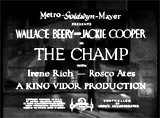


The Champ (1931), 85 minutes, D: King Vidor
Director King Vidor's sports-related film was a great, sentimental tearjerker (remade in 1979). It told the story of a down-and-out ex-heavyweight boxing Andy 'Champ' Purcell (Oscar-winning Wallace Beery) and his adoring son Dink (Jackie Cooper). Training in Tijuana for an eventual comeback, the washed-up boxer was also a drinker and a gambler. He was threatened with separation from his boy when the boy's mother Linda (Irene Rich) who had abandoned them but was now married to a wealthy husband, returned to regain custody of her son to raise him in a more favorable environment. In the climactic boxing bout, the Champ won a tough match against a Mexican fighter, but died with his son by his side in the locker room.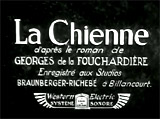

La Chienne (1931, Fr.) (aka The Bitch), 91 minutes, D: Jean Renoir
Director Jean Renoir's second sound film - a social drama, was controversial and banned in the US due to its racy subject matter. It was remade as the dark film noir Scarlet Street (1945) by Fritz Lang. In the plot, discontented, middle-class bank office clerk/accountant and part-time painter Maurice Legrand (Michel Simon) was unhappily married to domineering, shrewish and difficult Adèle (Magdeleine Bérubet). He began a secret romance with low-class, femme fatale prostitute/streetwalker "Lulu" or Lucienne (Janie Marèze) - the "bitch" of the film, and she became his mistress. Thinking she was vulnerable and abused, Legrand unwisely supported her and gave her an apartment - until he ran out of money. Instead, she was in love and under the control of her pimp Dédé (Georges Flamant). Dédé schemed to sell Legrand's paintings with Lucienne posing as the artist and signing Legrand's work. However, the film's love triangle ended violently. When Legrand found out about Lucienne's monetary conniving and infidelity, he jealously killed her by strangulation, although in the surprise ending, Dédé was convicted of the murder and sent to the gallows. In the final scene, Legrand was a tramp on the streets, ironically watching as one of his self-portrait paintings was profitably sold.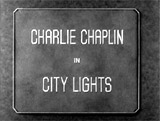



City Lights (1931), 87 minutes, D: Charles Chaplin
Charlie Chaplin's greatest masterpiece was the last of his totally-silent films. This memorable, quintessential "silent "film was released three years after the start of the talkies era of sound. It was a very moving and eloquent film again featuring the famous Little Tramp (Chaplin) character - an outcast, homeless man with baggy pants, tight coat, cane, large shoes and small hat. The Little Tramp fell in love with a blind Flower Girl (Virginia Cherrill), and also developed a friendship with a drunken Eccentric Millionaire (Harry Meyers). It was a tale of blind love - the Tramp functioned as a savior and wish-fulfiller for the two individuals - a blind flower girl while masquerading as her wealthy duke benefactor, and a drunk millionaire who was repeatedly saved and befriended. Unable to see him, the flower girl believed The Tramp was wealthy. He used money from the millionaire for an operation to restore the girl's sight. In the film's priceless ending, the girl (with her eyesight) learned the true identity of her benefactor.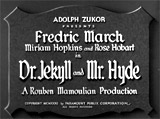

Dr. Jekyll and Mr. Hyde (1931), 98 minutes, D: Rouben Mamoulian
Rouben Mamoulian's spine-tingling Pre-Code horror film from Paramount Pictures was the first sound version of the story, adapted from Scottish author Robert Louis Stevenson's 1886 Gothic literary novella "Strange Case of Dr Jekyll and Mr Hyde." It was a story of transformative identity into bestiality and sexual deviancy. It told about a kind but fatally-curious medical doctor named Dr. Henry Jekyll (Fredric March) (pronounced "Jee-kall") who adventured into the unknown by self-testing an experimental serum formula that released the uninhibited, subconscious evil in his soul, and caused him to develop a monstrous split personality - as Mr. Hyde. The heavily-censored film featured themes of sexual abuse, man's dual nature, and repression. Fredric March won the Best Actor Oscar (the first Oscar-winning horror performance) for his dual, split personality role as a respected doctor and as a fiendish mad-man. The film had ground-breaking transformative special effects as March changed from Jekyll into Hyde. In the film's plot set in the late 18th century, Victorian London physician Dr. Henry ("Harry") M. Jekyll (Fredric March) indulged in spectacular theories" about the two natures of man in the human soul or psyche: (1) the good or noble, and (2) the impulsive, animalistic, or bad. He posited the notion that the two sides eternally struggled against each other, and if it was possible to separate, release, or 'unchain' them, it would liberate and free the good in man. Dr. Jekyll mentioned how he was experimenting in his laboratory with chemicals to accomplish the splitting of the two sides. Concurrently, Jekyll was romantically involved with spoiled, wealthy fiancee Muriel Carew (Rose Hobart), but their marriage was continually being postponed by her demanding father Brigadier-General Sir Danvers Carew (Halliwell Hobbes). Meanwhile one evening, Jekyll rescued a vulnerable female from one of her brutal "callers." He learned she was a promiscuous, slutty Cockney named "Champagne" Ivy Pearson (Miriam Hopkins). He carried her up to her second floor room and attended to her bruises - and was kissed in exchange for his services. She entreated and invited him with whispered words to return quickly: "Come back soon, won't you?....Oh yes you can. Soon...Come back." After discovering the correct potion to transform himself into the hideous, simian-like Mr. Hyde (his evil persona), the good doctor located Ivy at her place of work, the Variety Music Hall, where he exhibited sordid, vicious, sexually-decadent and sadistic behavior toward her, and began to regularly abuse and beat her in her apartment. Jekyll also discovered to his horror that he could spontaneously revert to his alter-ego without drinking the potion. Eventually, Hyde murdered his lover-turned-tragic victim Ivy. He jealously told her that he knew all about her relationship with Dr. Jekyll: ("I know everything you do and everything you think!") - and accused her of only desiring Jekyll's love: ("You wanted him to love you, didn't you? I'll give you a lover now. His name is death!"). He then revealed that he and Jekyll were one and the same ("I AM JEKYLL") - before he strangled her in her bedroom. As she dropped to the floor, behind her was a sculpture of Cupid and Psyche. In the finale, as Mr. Hyde, Jekyll attacked his fiancee Muriel, and caned her father to death. After being hunted by London police to his laboratory, he was confronted and killed, and as he died, they watched in amazement as he reverted back to Dr. Jekyll.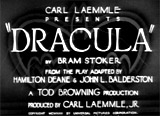


Dracula (1931), 75 minutes, D: Tod Browning
Director Tod Browning's creepy, weird, and frightening film defined the genre of horror pictures, with tremendous atmosphere and dialogue. The title character, Count Dracula (Bela Lugosi) - a Transylvanian vampire with a lilting Hungarian accent, had moved from Europe to London to find his true love and satisfy his craving for human blood. In a secondary role, Dracula's insane slave Renfield (Dwight Frye) aided his quest. The Count lured and victimized innocent English women, leading them to his underground vaults.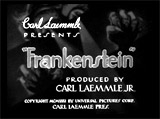


Frankenstein (1931), 71 minutes, D: James Whale
Director James Whale's great horror classic from Universal Pictures (production by Carl Laemmle, Jr. - the head of the studio), although antiquated, was based upon Mary Shelley's 1818 horror novel. It was followed by Bride of Frankenstein (1935). In a small Bavarian village, obsessed Dr. Henry Frankenstein (Colin Clive), assisted by crazed dwarf Fritz (Dwight Frye), conducted strange experiments in his mad search to create artificial life. The two were first seen stealing a body from a fresh cemetery grave and a gallows-hanging at midnight, to provide body parts. The theft of a normal brain from a nearby medical school was botched by Fritz, and a criminal's brain was obtained instead. The tirelessly-working Dr. Frankenstein in his elaborate laboratory in the watchtower of his Victorian manor reluctantly allowed his fiancee Elizabeth (Mae Clarke), his friend Victor Moritz (John Boles) and his old college professor and mentor Dr. Waldman (Edward Van Sloan) to visit. During a violent thunderstorm, Frankenstein harnessed the power of lightning to jolt life into his inanimate monstrous cadaver strapped to an operating table. He cried insanely at his hideous creation: "Look! It's moving. It's alive. It's alive....It's alive, it's moving, it's alive, it's alive, it's alive, it's alive, it's alive!" The hideous Monster (Boris Karloff with a superb rendering of the pathetic, innocent figure, without dialogue), created out of body pieces, was truly frightening, and kept locked up in the dungeon of an old mill, where it was tortured by Fritz. Ultimately uncontrollable, the mad doctor's creation (around the time of Frankenstein's planned marriage to Elizabeth), murdered Fritz, strangled Dr. Waldman in the lab, escaped from the tower and terrorized the countryside, including accidentally drowning young peasant girl Maria (Marilyn Harris) while throwing flower petals into a body of water with her. The angry townspeople who had organized into a torch-bearing mob searched for the scorned and lonely creature. During pursuit, the Monster faced his creator one-on-one on a rocky hilltop, dragged Frankenstein to the old milltower and then flung him to the ground (causing injuries), and then was burned alive in the mill that had been set on fire by the villagers. In the epilogue, Dr. Frankenstein was still recovering and not married to Elizabeth.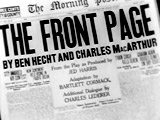

The Front Page (1931), 101 minutes, D: Lewis Milestone
This visually fast-paced screwball comedy-drama (film-produced by Howard Hughes for UA and directed by Lewis Milestone), contained swift, sharp dialogue and non-static action. It was set in 1920s Chicago and faithfully captured the milieu of unscrupulous newspapermen and politicians. This first film version of the original Broadway 1928 Ben Hecht-Charles MacArthur play (directed by George S. Kaufman) was followed by three remakes: director Howard Hawks' classic His Girl Friday (1940) (with the character of Hildy Johnson played by a female, Rosalind Russell), director Billy Wilder's The Front Page (1974) (with Jack Lemmon and Walter Matthau), and Switching Channels (1988). In this original early talkie version, fast-talking, scheming ruthless editor Walter Burns (Adolphe Menjou) battled with his ace reporter Hildebrand "Hildy" Johnson (Pat O'Brien) and with City Hall. Hildy wanted to leave crooked big-city life and the newspaper racket to get married to Peggy Grant (Mary Brian), but was convinced by Burns to stay and cover one last story. Hildy joined other reporters in the Press Room of the Criminal Courts Building to cover the hanging-execution of an accused radical who killed a black cop - a poor clerk named Earl Williams (George E. Stone) who claimed he was innocent. When Williams escaped, Burns schemed to manufacture a story "scoop" that would embarrass the police, and expose the political corruption of Sheriff Peter "Pinky" Hartman (Clarence Wilson), a manipulated puppet of the city's Mayor (James Gordon) who was facing a re-election campaign and was trying to manipulate the black vote. To everyone's surprise, fugitive Williams remained in the building, although a city-wide manhunt was undertaken. Alone in the Press Room, Hildy encountered Williams and persuaded him to hide in a roll-top desk. Meanwhile, the Governor's reprieve for Williams was delivered, and the Sheriff attempted to bribe the messenger to return later. Although temporarily arrested, Hildy and Burns succeeded in revealing the city's administrative corruption when the Governor's messenger returned. The film concluded with Hildy deciding to remain as a newspaperman with Burns. The last line ("son-of-a-bitch") was censored - covered over by the sound of a typewriter.


M (1931, Germ.), 117 minutes, D: Fritz Lang
Director Fritz Lang's highly influential, first sound film was an expressionistic psychological thriller about a child molester. Police in Berlin in the 1930s were unable to apprehend a kidnapper and pedophile serial killer of little girls. The 9th victim had just been found - Elsie Beckmann (Inge Landgut). Criminals in the underworld joined in the hunt, aided also by the beggars' association. Their first major tip was from a blind balloon peddler (Georg John) who heard a suspicious man whistling Edvard Grieg's "Hall of the Mountain King" from the 'Peer Gynt' Suite at the same time that the man bought a balloon (to lure the unsuspecting young female victim). The psychopath was identified as Hans Beckert (Peter Lorre) - his coat back was marked in chalk with the letter "M" by one of the beggars. Beckert was caught hiding in an attic, and taken to a large abandoned brewery building to stand trial, where he was questioned by a panel of underworld boss-leaders, headed by chief judge Schranker (Gustaf Gründgens). During the kangaroo court hearing, Beckert groveled on the floor, expressed his terror through his bulging eyes, and confessed to his crimes, claiming that he was compelled by an evil voice and uncontrollable inner impulses to kill - and couldn't stop himself. Beckert's defense counsel (Rudolf Blümner) argued that the "insane" Beckert wasn't responsible for his actions, and should be turned over to police and the state - to institutionalize and/or cure him. Although the crowd urged Beckert to be eliminated, the police arrived and escorted him away before a decision was made.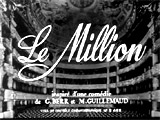

Le Million (1931, Fr.) (aka The Million), 89 minutes, D: René Clair
Director Rene Clair's technically-groundbreaking, inventive, influential and entertaining French film musical was adapted from a successful stage production. Michel Bouflette (René Lefèvre), an impoverished Parisian artist, was perpetually annoyed by numerous creditors. In the apartment of his long-suffering fiancée, ballerina Béatrice (Annabella) - who was endlessly waiting to get married to her flirtatious boyfriend, Michel's worthless, torn, and tattered jacket ended up in the hands of elderly and eccentric on-the-run thief Grandpa Tulip (Paul Olliver). Michel realized that in the pocket of the jacket was his winning ticket in the Dutch lottery, with a prize of a million guilders. There was a race across Paris with his best friend-rival Prosper (Louis Allibert) to recover the jacket concealing the winning lottery ticket.
Monkey Business (1931), 77 minutes, D: Norman Z. McLeod
This was the Marx Brothers' third film - and their first film made in Hollywood (and their first film from an original screenplay). Their two previous films, the musical-comedy The Cocoanuts (1929) and Animal Crackers (1930) were essentially recreations of their 1925 and 1928 Broadway stage versions, respectively. All of their films were essentially plotless - but full of non-stop hijinks, sight gags, pratfalls and witty quips and insults. Their next two films for Paramount were Duck Soup (1932) and Horse Feathers (1933). The 'madcap' four Marx Brothers (the mustached, quick-witted Groucho, childlike mute pantomimist and harpist Harpo, piano-playing and Italian-sounding Chico, and straight-man Zeppo), with their anarchistic sense of lunatic humor, were introduced as stowaways on a trans-Atlantic ocean liner. They were harmoniously singing "Sweet Adeline" and making breakfast, in barrels located in the forward hatch of an Atlantic-crossing ocean liner - labeled Kippered Herring. Groucho tried unsuccessfully to impersonate the ship's Captain Corcoran (Ben Taggart) by phoning for lunch (and dinner). After being discovered, the remainder of their voyage was mostly composed of chase sequences by naval officers after the four brothers. The sustained pursuit took them up and down stairs, into staterooms, around a swimming pool, into the first class lounge, and onto the orchestra stand. Harpo hid in a Punch and Judy puppet show and entertained the children as the authorities tried to capture him. They became involved with feuding rival gangsters: ex-bootlegger and racketeer "Big Joe" Helton (Rockliffe Fellowes) (with pretty daughter Mary (Ruth Hall)), and Alky Briggs (Harry Woods). Chico and Harpo were hired as bodyguards for Big Joe. As usual, Groucho attempted to romance Briggs' blonde wife, Lucille (played by his frequent foil Thelma Todd), and Groucho was even able to fool Briggs into hiring him and Zeppo to work as bodyguards. On shipboard, one of the funniest skits was the very funny barbershop scene when Chico and Harpo impersonated the barber and shaved off ('snoop off') the entire long handlebar mustache of one of the ocean liner's crew members, who requested: "Give me a once-over." Once the boat docked in NYC, all four brothers stole Maurice Chevalier's passport and at customs attempted to impersonate the well-known French singer/actor by performing "You Brought a New Kind of Love to Me." Harpo almost succeeded with a Victrola record player strapped to his back (until the tempo slowed down). They eventually were seen disembarking on a stretcher, taking the place of a passenger who had fainted. When the scene shifted to Big Joe's high-society Long Island estate, Groucho continued to pursue Lucille. Meanwhile, Briggs' men kidnapped Helton's daughter Mary who was held in an old barn, where Groucho presided (and looked for a needle in a haystack), and the other three brothers played a version of 'wheel of fortune' before Zeppo rescued Mary.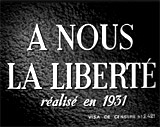


À Nous la Liberté (1931, Fr.) (aka Freedom For Us), 104 minutes, D: René Clair
Director Rene Clair's satirical, fantasy comedy was about dehumanizing industrialization and mass production (and an inspiration for Chaplin's Modern Times (1936)). Its story was told through the lives of two cellmate convicts: Émile (Henri Marchand) and Louis (Raymond Cordy), who were incarcerated in a French prison. After escaping to the outside world, ex-prisoner Louis became a gramophone salesman, and then opened up his own successful phonograph manufacturing company, with his workers reduced to robotic automatons on an assembly line. Later, Émile was released from prison, and became a low-level worker in Louis' factory - but was not aware that Louis was the owner/director. Fearing discovery and pursuit by the authorities, Louis gave his factory over to his workers, and with Émile, took to the open road of freedom as tramps.


The Public Enemy (1931), 83 minutes, D: William A. Wellman
Director William Wellman's powerfully stunning, gritty Pre-Code gangster film was about 1920s hoodlums - and was noted as the film that launched James Cagney as a typecast star. This was a larger than life portrayal of the rise of a vicious, brutal, arrogant Irish gangster. It appeared alongside another major Warner Bros.' gangster film, Little Caesar (1930). In the plot, two young Chicago street toughs or punks (both Irish-Americans) on the South Side grew up together during Prohibition: Tom Powers (Frank Coghlan Jr. as boy, James Cagney as adult) and Matt Doyle (Frankie Darro as boy, Eddie Woods as adult). Tommy exhibited meanness, dishonesty, and early criminality, and with his best friend Matt, they worked for a swindling fence named "Putty Nose" (Murray Kinnell) who paid them for stolen items. By 1915, the boys were teenaged hoodlums, each offered a gun as a Christmas present and hired by "Putty Nose" to rob The Northwestern Fur Company warehouse. They bungled the armed theft and a third gang member was shot dead by a policeman. And then as they fled from the scene, Tom killed the policeman, causing "Putty Nose" to thereafter abandon them. In 1917, Tom and Matt were delivery truck drivers but decided to make more money by working for big-time, better-connected underworld operator Patrick "Paddy" J. Ryan (Robert Emmett O'Connor). By 1920, one of their biggest jobs was to steal a tank load of alcohol from a "booze warehouse" and earn a three-way split of $150,000. Tom and Matt became involved in the corrupt and violent business of truck-driving for bootleggers during Prohibition, working for Paddy and allied with Samuel "Nails" Nathan (Leslie Fenton), against an opposing gang run by Schemer Burns. Tom and Matt served as the enforcing "trouble squad" - they were on their way from small-time thievery, to bootlegging, and then onto becoming murderous gangsters. Tom's strait-laced veteran brother Mike (Donald Cook), returning shell-shocked from the war, was completely opposed to Tom's dishonest criminal life, and their widowed mother (Beryl Mercer) was naively unaware of Tom's career. Tom countered his brother's dissatisfaction with disgust: "Your hands ain't so clean. You killed and liked it. You didn't get them medals for holding hands with them Germans." The film was memorably known for the infamous scene of Tom's nagging mistress Kitty (Mae Clarke) having a grapefruit smashed in her face during a breakfast argument. Soon after, Tom dumped Kitty and began dating another glamorous moll - mysteriously cool Texas blonde Gwen Allen (Jean Harlow) who he met on the street. Matt and Tom sought revenge against long-time gang-leader "Putty Nose" who Tom claimed had led him into a life of crime. He was mercilessly murdered (off-screen) by Tom in cold blood as he played the piano. In another crude murder scene, Tom vengefully executed Rajah, a "spirited horse," after his gangster boss "Nails" Nathan died in a horse-riding accident (he fell off the horse and was kicked in the head). Tom bought the horse for $1,000 and then promptly shot it in its stall (off-screen). A gang war power struggle erupted after "Nails"' death. The rival Burns gang bombed Paddy Ryan's headquarters and their brewery was set on fire. As Tom and Matt left Paddy's home, they were machine-gunned down on the street from a perch set up across the street - and Matt lost his life. In a climactic shoot-out scene, the vengeful Tom single-handedly slaughtered and eliminated the rival Schemer Burns gang headquartered at the Western Chemical Company as the camera deliberately remained on the outside of the building while a barrage of shots and moaning screams of the wounded and dying were heard from inside, but then Tom stumbled seriously wounded onto the rain-soaked street, fell into the gutter, and muttered to himself: "I ain't so tough." While Tom was hospitalized, a family visit brought Tom and his brother Mike to reconcile with each other. Tom sincerely apologized: ("I'm sorry"), and expected to return home after recovering, and his mother was overjoyed. In the final horrifying scene, the Powers home expected that Tommy would soon be coming home from the hospital. However, Paddy reported that the Burns' gang had kidnapped Tom from the hospital. Paddy had negotiated to "quit the racket" if they let Tom go. A phone call was soon received that Tom was indeed "on his way" home. His mother cheerfully went upstairs and hummed to herself as she prepared his room for his home-coming. In the rival gang's gruesome plan after kidnapping him from the hospital, they gift-delivered Tommy's bullet-ridden, rope- and blanket-wrapped 'mummified' corpse/body, announced by a knock on the door. When his brother Mike answered the front door, Tommy's mummy-body fell and crashed with a dull thud - face-first onto the floor.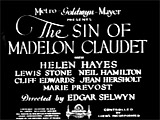

The Sin of Madelon Claudet (1931), 74 minutes, D: Edgar Selwyn
This sentimental tale of motherly sacrifice was a tearjerking melodrama (filmed eight times between 1915 and 1981), scripted by the title star's husband Charles MacArthur. It told about French rural girl Madelon Claudet (Oscar winnng-Helen Hayes in her first sound film) who had an illegitimate son after being seduced by American artist Larry Maynard (Neil Hamilton). He soon after abandoned the family and married someone else. Her next affair with Carlo Boretti (Lewis Stone) ended with him arrested for a jewel robbery and a suidice. Charged as Carlo's accomplice (and sentenced to 10 years), she was forced to give up her son, lost her social standing, and became a haggard streetwalker who also performed robberies. She secretly devoted her entire life to her son Lawrence Claudet (Robert Young), even financially supporting him in medical school.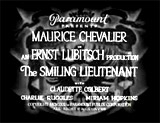


The Smiling Lieutenant (1931), 102 minutes, D: Ernst Lubitsch
This early, pre-Code Ernst Lubitsch musical set in Vienna told about a love triangle as it commented upon changing sexual mores. The main three characters in the Best Picture-nominated light musical were: Lieutenant Niki von Preyn (Maurice Chevalier), a charming officer in the Viennese Royal Guard, Franzi (Claudette Colbert), a cute beer garden violinist and conductor of an all-female orchestra, and Princess Anna (Miriam Hopkins), the sexually-repressed princess of Flausenthurm. In the comedy, Niki left his mistress Franzi for the visiting Austrian Princess, and by the film's final scene, the Lieutenant was forced to marry the Princess. However, Niki refused to romance her since he was continuing to have a 'stepping out' affair with Franzi - until Princess Anna discovered their indiscretions. The sexually-liberated Franzi was called to the palace where she gave the Princess a lesson on sexiness by wearing modern lingerie and fashions. She also advised her on her unconsummated marriage. As a result of Franzi's romantic self-sacrifice at the film's end, the randy Lieutenant sang suggestively toward the film audience as he closed his bedroom door - his marriage was saved and he had renewed his love-making interest in the Princess.



Tabu (1931) (aka Tabu: A Story of the South Seas), 84 minutes, D: Robert J. Flaherty, and F.W. Murnau
This visually-beautiful, expressionistic, quasi-documentary, and poetic piece of filmmaking featured an all-native cast. During production of this documentary-styled film, co-scriptwriter and documentary film-maker Flaherty left mid-way through, and then just days before the film was released, director Murnau was killed in an auto accident. This film encouraged the trend of other popular, exploitational and lucrative 'bare native' films in its wake in the early to mid 1930s - after sights of polynesian girls swimming or dancing partly naked in the film. It told of native South Seas love and Tahitian island life (with flower-garlanded, bare-breasted native dancers). The tale of ill-fated romance (a star-crossed love a la Romeo and Juliet style) involved the breaking of a sacred tabu. As the film opened, a love affair had developed between two Polynesian natives: South Sea Island beauty, the Girl (as Reri) (Anne Chevalier), and a pearl diver, the Boy (as Matahi) during a scene of 'Paradise"-like swimming. But then, Reri was designated as the successor to the deceased former Chosen one by a grim-faced, harsh tribal elder known as the Old Warrior (Hitu). She was outcast and considered the island's "sacred virgin" that was now "taboo" to all islander men. After Reri's selection, there was celebratory native dancing of flower-garlanded, bare-breasted native dancers, although during the ceremony, Reri sat with her head down. In the next chapter, titled "PARADISE LOST," the Boy kidnapped the Girl and they lived together on another island. They had to evade the never-ending, relentless pursuit by Hitu after the "guilty lovers." In a heartbreaking separation scene - the Girl was snatched by the Old Warrior. She wrote a goodbye letter to the Boy: ("I must go Hitu is here and waits for me You will die if I do not obey I will go so that you may live The Tabu is upon us. I have been so happy with you Far more than I deserved the love you have given me I will keep to the last beat of my heart"). In the tragic ending, as the Boy frantically swam after their sailboat, she was placed in a cabin and the hatchway was pulled over to enclose her, while the rope was cut that the Boy grabbed onto. He had to give up swimming - and presumably died of exhaustion in the open ocean.